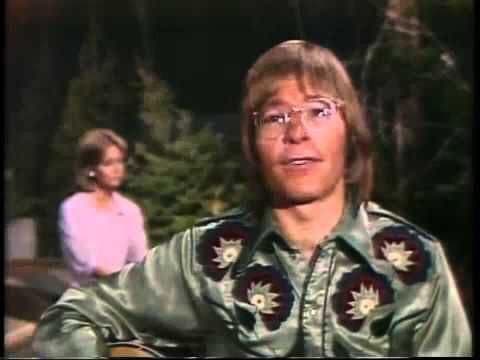
A Gentle Yearning for Simplicity and Escape from the Clamor of Modern Life
Ah, the mid-seventies! What a remarkable time it was, full of change, searching, and a gentle wave of introspection that washed over the airwaves. This period gave us many memorable tunes, but few capture that subtle ache for a simpler existence quite like “Fly Away,” the exquisite 1975 single penned and performed by the eternally sun-drenched John Denver, featuring the sweet, comforting harmony of the late, great Olivia Newton-John. This isn’t just a song; it’s an invitation, a soft-spoken plea to leave the noise and confusion behind and seek solace in a place where the soul can breathe.
Released in November 1975 from Denver’s album “Windsong,” the track quickly resonated with listeners searching for an escape from their everyday pressures. On the Billboard Hot 100 chart, “Fly Away” peaked at a respectable No. 13, a solid performance in a year packed with musical giants. Yet, its true home, and where it soared the highest, was on the adult contemporary charts. It spent a comforting two weeks atop the Adult Contemporary chart in early 1976, marking Denver’s sixth number-one on that particular listing—a testament to its soothing, contemplative quality that spoke directly to the hearts of an older, more reflective audience. It also showed a respectable presence on the country charts, peaking at No. 12.
The genius of “Fly Away” lies in its poignant, almost melancholy narrative. It tells the story of a woman whose life in the city has left her “soft and cloudy,” her dreams “gone dry,” and her nights “sad and shady.” The metropolis, with its high-rises and endless rush, has made her “crazy” for the “sounds of the sand and the sea” and “hungry for things that you can’t even see.” Many critics at the time pointed out that John Denver was acknowledging his average listener, perhaps those in urban settings who longed for the pastoral landscapes and clear skies that defined his music. This longing for a connection to nature, for an escape from the concrete jungle’s emotional toll, is the very meaning and soul of the song. It’s a quiet acknowledgment of the human need for genuine peace and a place where one is not the “lonely” one.
The addition of Olivia Newton-John’s vocals, uncredited on the 45 single itself but listed in the “Windsong” album notes, is the perfect complement to Denver’s warm tenor. Her gentle voice adds a layer of empathy and shared experience to the chorus, turning a solitary search into a shared yearning. It softens the edges of the despair in the verses, transforming the desperation of the city-dweller into a hopeful journey. It’s a quiet duet that feels like two friends sharing a moment of deep, mutual understanding, a warm hand on a troubled shoulder. For many of us who remember this era, the song evokes a powerful wave of nostalgia—for simpler days, for the comforting sound of two voices that defined so much of the best soft rock and country-pop of the decade, and for that universal, timeless desire to simply fly away from it all. It’s a piece of musical history, a beautifully preserved moment of shared longing that sounds just as meaningful today as it did nearly fifty years ago.